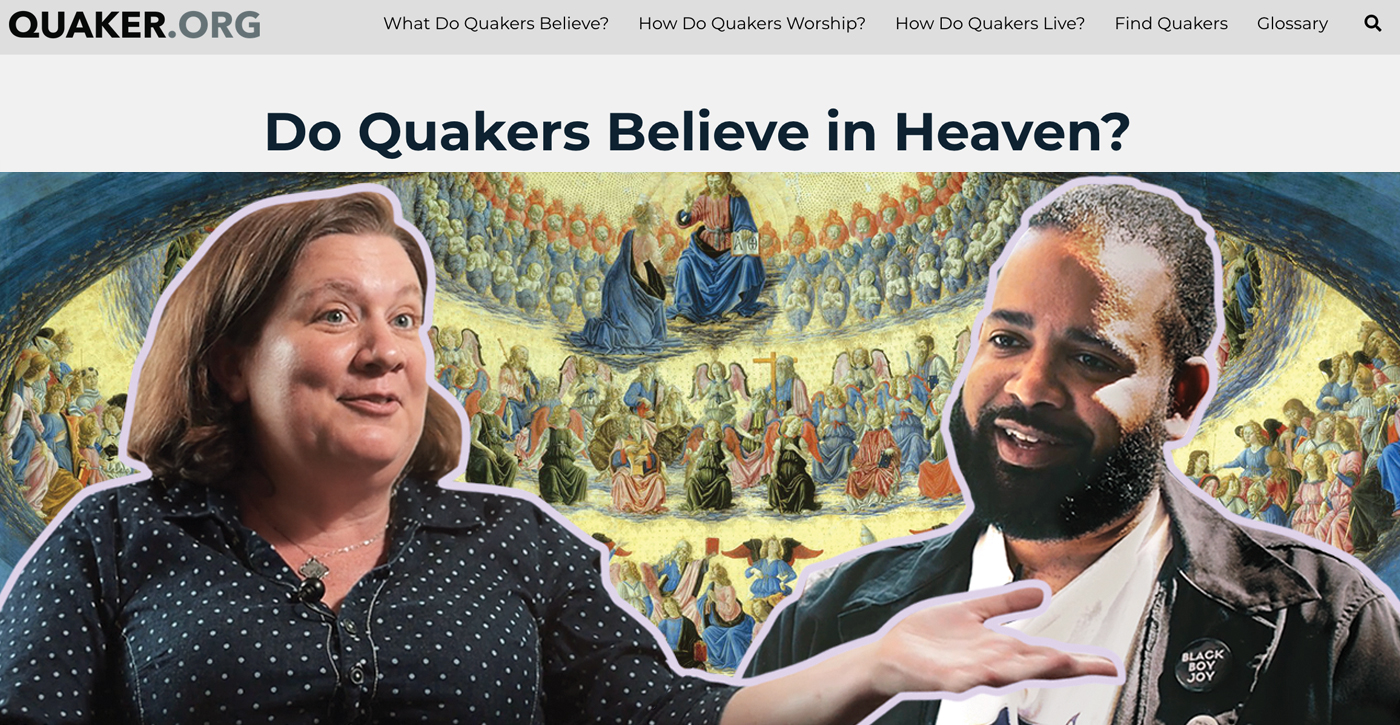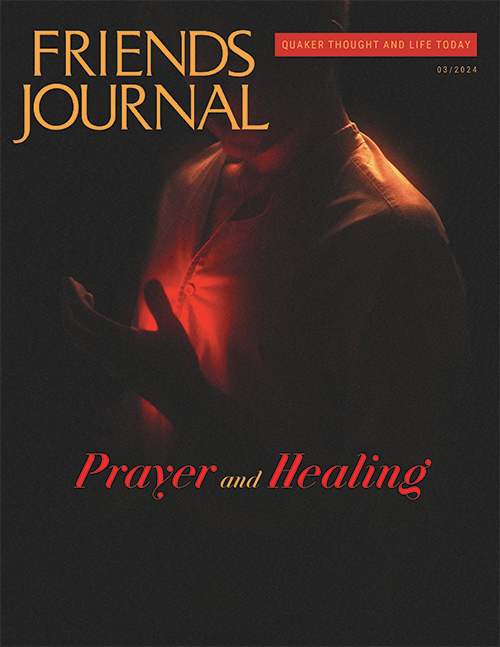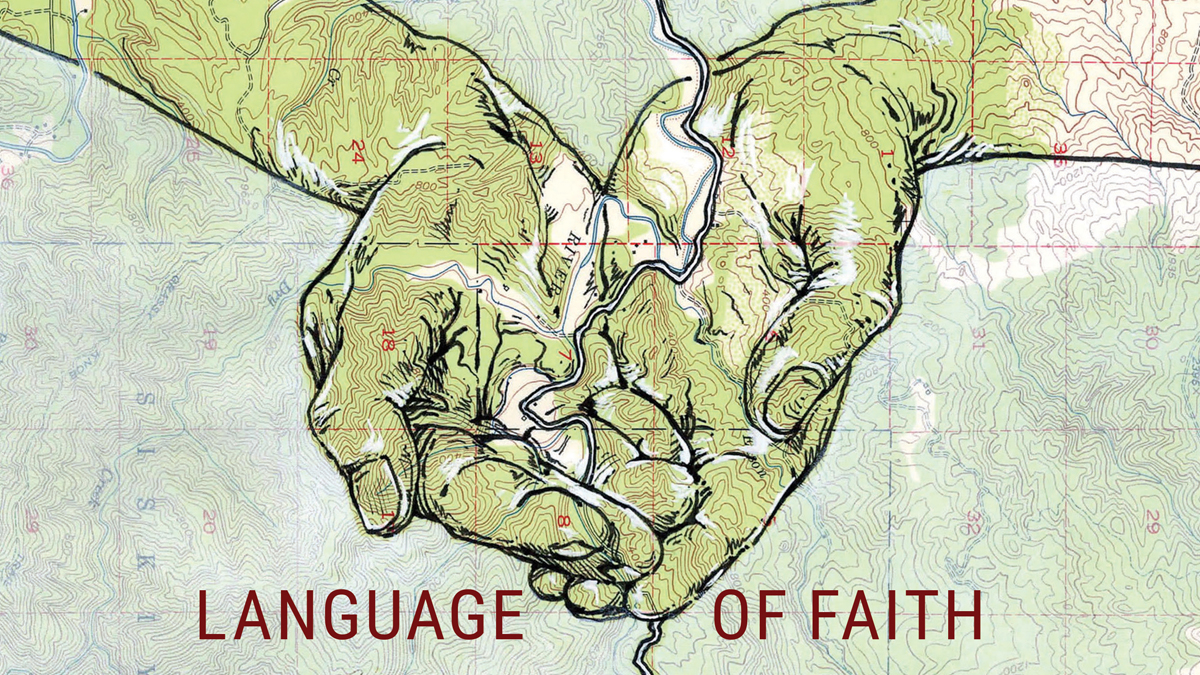Have you visited our outreach site Quaker.org yet? Friends Publishing acquired the domain back in 2018, and since then we’ve turned it into a resource aimed at online seekers and curious people wanting to learn more about the Religious Society of Friends. It answers many basic questions (What do Quakers believe? How do Quakers worship? How do Quakers live?), as well as exploring central testimonies like peace, simplicity, and equality. The site also provides information on more specific questions; a popular one is, do Quakers believe in heaven? Our staff writer Sharlee DiMenichi went looking for an answer and found a few. The following is an excerpt from that page, Quaker.org/do-quakers-believe-in-heaven.
Some Quakers believe that when we die, we enter a realm of pure love that expands upon our spiritual experience of God’s love during our mortal lives. Others believe that we will enter the presence of Jesus and stay with him through eternity. And some Friends consider death the end of our existence. Here are some insights into Quakers’ varying spiritual approaches to death and beliefs about the afterlife.
George Fox and the original Quakers believed they were living in the era of Christ’s return to earth, so they did not emphasize the afterlife. They considered themselves the people who would usher in Jesus’s millennial reign, an event many Christians believe the biblical book of Revelation predicts, so they tried to create a peaceable kingdom in their meetings. Even after Friends stopped believing they were living in apocalyptic days, their faith centered on the present life, not on existence after death.
Nearly four centuries later, many Liberal Friends continue to de-emphasize the afterlife or disbelieve in it altogether. In a 2001 sociological study comparing the beliefs of Anglicans and Quakers, University of Reading (UK) master’s degree candidate Jan Swallow interviewed 28 volunteers from five local Friends meetings in Britain regarding their views on the afterlife. She discovered much diversity in the Friends’ beliefs. The Quakers Swallow interviewed often prioritized living ethically in the current life over the expectation of an afterlife. Those Friends who identified as Christ-centered did not consider a belief in eternal life central to Christian faith. The Christocentric Quakers thought that faith in life after death might corrupt someone’s motives for following Jesus. The interviewees knew a good deal about the post-death beliefs of adherents of other faiths. When answering questions on their convictions about the afterlife, Quakers often supported their beliefs by referring to personal experiences.
Many traditionalist Friends, who adhere to the Christian understandings of early Quakers, do seek solace in a belief in the afterlife. The Book of Discipline of Ohio Yearly Meeting, which consists of Conservative Friends, has this to say about funerals:
The simplicity of a meeting for worship is desired in the conduct of funerals. They should be occasions when things temporal are secondary, when the reality of life immortal is deeply felt, and when the presence of our Lord brings hope, comfort, and consolation to the bereaved.
Evangelical Friends, such as those in the MidAmerica Yearly Meeting, believe that judgment of the dead will occur when Christ returns to earth. Their online statement of Faith and Practice expands on this idea:
The dead shall be resurrected, some to eternal life, others to everlasting punishment. All shall be judged by God and receive just recompense for their deeds. The blessed ones shall live forever in heaven, but the lost suffer eternally in hell.
Members of Friends United Meeting (FUM) in East Africa hold similar views. “God does not want anyone to perish unsaved and has given each of us the capacity and opportunity to hear the invitation of Jesus to be restored to God,” FUM’s Christian Faith and Practice in the Friends Church explains. “Those who remain obstinate in sin and persist in ignoring the invitation of Jesus to be forgiven and saved are in grave danger of eternal separation from God. This state of eternal separation from God is known as hell.”
A contrasting vision of the afterlife known as universal salvation argues that a truly loving God would never subject a person to eternal torment, and that heaven could not truly be paradise if those in it knew any of their loved ones were suffering in hell. In this view, death is not the end of the soul’s effort to be “restored to God,” and God will wait as long as it takes for every soul, even those whom we would consider evil in their lifetimes, to reach that point.
But even in yearly and monthly meetings that do not emphasize a Christian vision of the afterlife, Friends recognize the value in preparing oneself spiritually for death. Langley Hill Meeting in McLean, Va., for example, offers queries such as these for contemplation: “Am I prepared to meet my Maker? What do I need to do or feel now, to be ready for death? Can I accept that I did all that I did, and can’t undo it?”






Comments on Friendsjournal.org may be used in the Forum of the print magazine and may be edited for length and clarity.